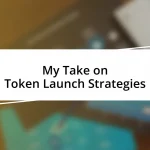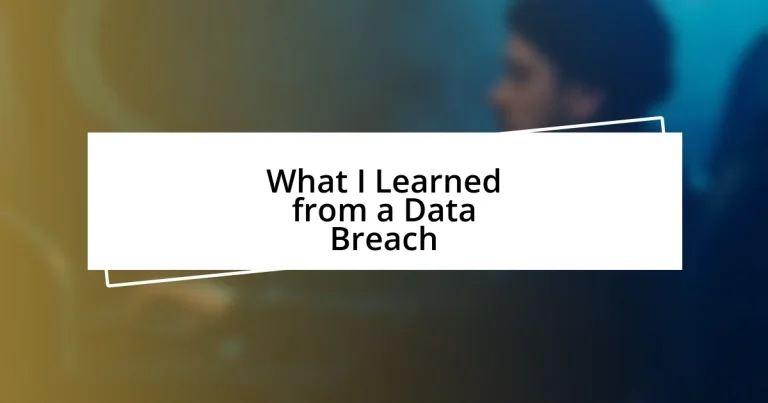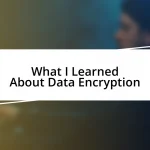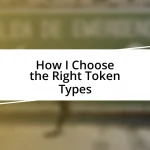Key takeaways:
- Data breaches occur due to unauthorized access to sensitive information, often caused by human error, inadequate security measures, or phishing attacks.
- Proactive personal security measures, such as using strong unique passwords, enabling two-factor authentication, and staying informed about cybersecurity trends, are crucial to prevent breaches.
- Effective response to a data breach includes quick action (like changing passwords), proper documentation of events, and transparent communication with affected parties to rebuild trust.
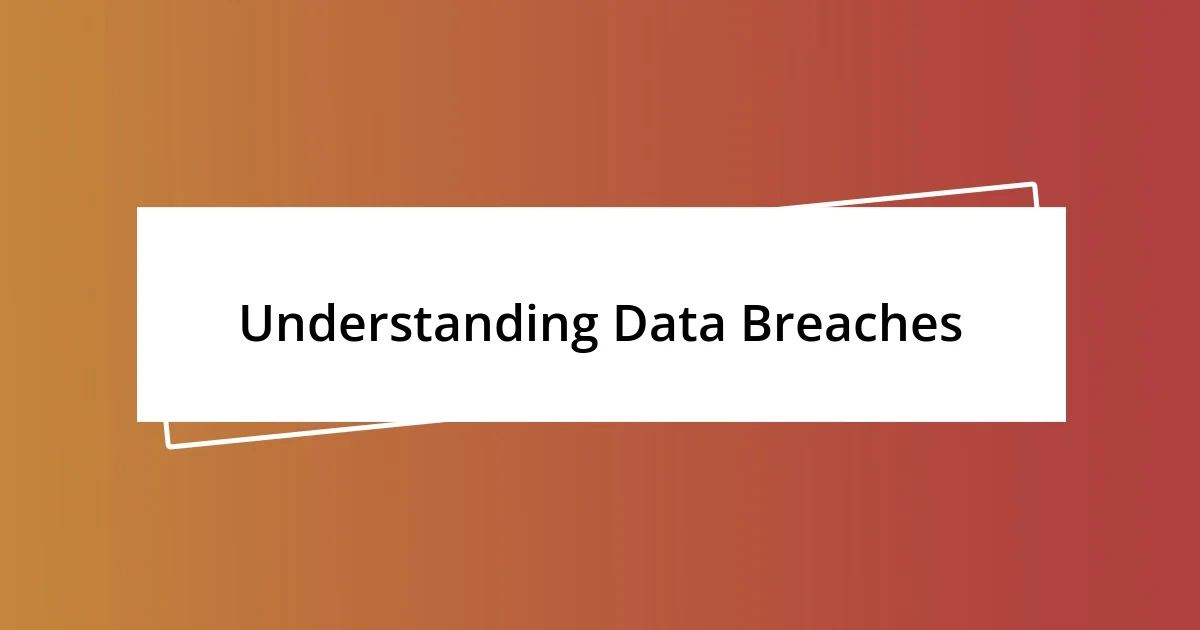
Understanding Data Breaches
A data breach is more than just a technical failure; it’s a profound violation of trust. I remember a few years ago when my favorite online service got hacked, exposing the personal information of millions. I felt a mix of anger and vulnerability—how could this happen to a company I believed in?
Understanding the inner workings of data breaches often helps us grasp their impact. These incidents occur when unauthorized individuals access confidential data, often through hacking techniques or phishing scams. Have you ever clicked on a dodgy link? I have, and it made me realize just how easily our data can fall into the wrong hands.
The emotional toll of a breach can be long-lasting. After that incident with my service, I checked my accounts obsessively for weeks. It’s a chilling reminder that what we consider private can become public in an instant, leaving us to grapple with the aftermath. Isn’t it unsettling to think that just one small mistake could expose our most sensitive information?
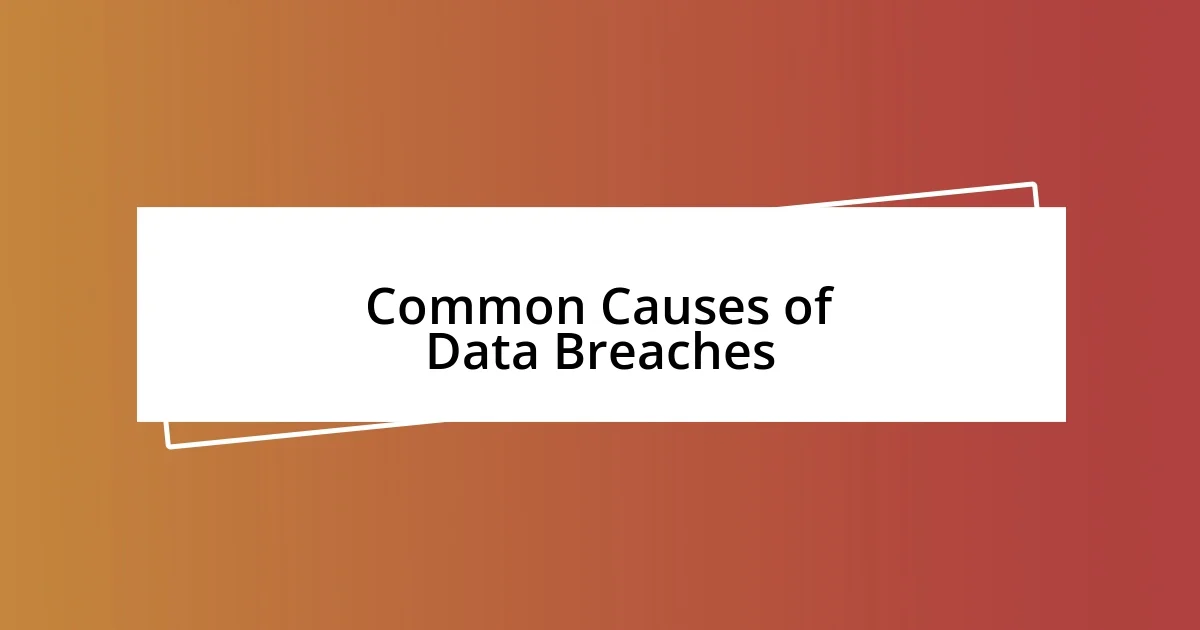
Common Causes of Data Breaches
Data breaches often stem from a variety of areas, each contributing to the potential vulnerability of sensitive information. I’ve noticed that one of the most common causes is human error. For example, last year at work, an employee mistakenly sent a spreadsheet containing confidential client data to a large email distribution list instead of a single coworker. The panic that ensued was palpable—it’s astonishing how a simple mistake can have far-reaching consequences.
Another prevalent cause is inadequate security measures. I recall chatting with a friend who runs a small business; he admitted that he didn’t update his software regularly. This negligence can leave systems exposed to known vulnerabilities, making it easier for cybercriminals to gain access. It’s a stark reminder that maintaining security is not a one-time event but an ongoing commitment.
Finally, phishing attacks are a major threat. I remember receiving an email that looked exactly like it came from my bank, asking me to verify my account. The fear of possibly compromising my information made me hesitate before clicking the link. Scammers are becoming increasingly sophisticated, making it crucial to stay vigilant and informed about how to recognize these threats.
| Cause | Description |
|---|---|
| Human Error | Unintentional mistakes by employees, such as sending sensitive information to the wrong recipient. |
| Inadequate Security Measures | Failing to implement proper security protocols or software updates that leave data exposed. |
| Phishing Attacks | Fraudulent attempts to obtain sensitive information by disguising as a trustworthy source, often through email. |

Lessons Learned from My Experience
After experiencing a data breach, I learned just how critical it is to take proactive steps in safeguarding personal information. It was a wake-up call that made me reevaluate my approach to online security. I used to think my passwords were strong enough, but I quickly realized that frequent changes and unique passwords for different accounts can make all the difference.
- Always use two-factor authentication wherever possible.
- Regularly update passwords and use a password manager to keep track of them.
- Be cautious about sharing personal information online, even on platforms I trust.
One of the most significant lessons I internalized was the importance of staying informed. I remember discussing my experience with a friend who was oblivious to many security threats. It struck me how knowledge truly is power—understanding what to look out for, like suspicious emails, has become an essential part of my digital life. Being educated about data breaches doesn’t just protect me; it empowers me to help others around me too.
- Join forums or community groups focused on cybersecurity awareness.
- Share what I’ve learned with friends and family to foster a culture of vigilance.
- Take advantage of online resources and courses that explain cybersecurity risks simply and clearly.
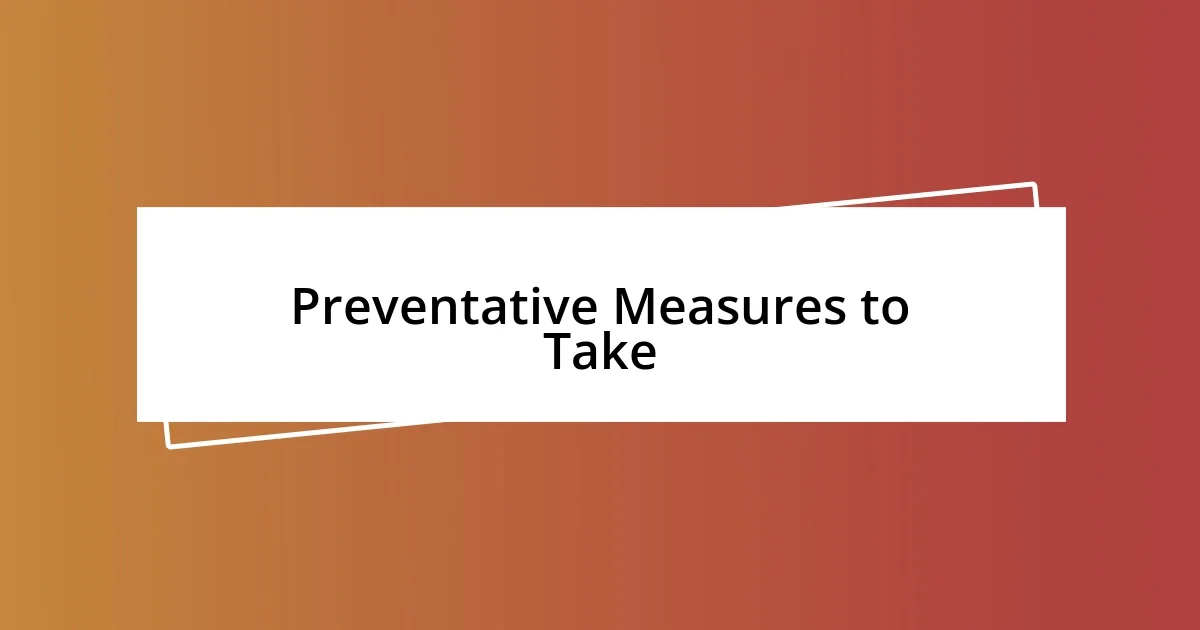
Preventative Measures to Take
When it comes to preventing data breaches, one of the most effective measures I’ve implemented is adopting a robust password strategy. I still remember the frustration of being locked out of my accounts because I didn’t keep track of my passwords properly. Using a password manager not only helps in generating strong, unique passwords but also keeps me from falling into the trap of reusing easy-to-remember variations. Are you still using the same password for multiple accounts? Trust me, diversifying them is a game changer.
Another critical preventative measure is enabling two-factor authentication (2FA). I once received a text alerting me that someone attempted to log into my account from an unrecognized device. The 2FA barricaded that intruder, and it felt empowering to know that an extra layer of protection was in place. Engaging in this simple step significantly minimizes the risk of unauthorized access, making it a must for anyone serious about securing their online presence.
Finally, staying educated about the latest cybersecurity trends can’t be overstated. I often find myself skimming through articles or attending webinars, and it never fails to amaze me how many new tactics hackers are deploying. Shouldn’t we arm ourselves with knowledge to stay a step ahead? The peace of mind that comes from being informed about the latest scams and security measures is invaluable. Sharing this information with close friends and family creates a community of awareness that’s hard to penetrate. It’s not just about protecting myself; it’s about creating a shield around my loved ones too.
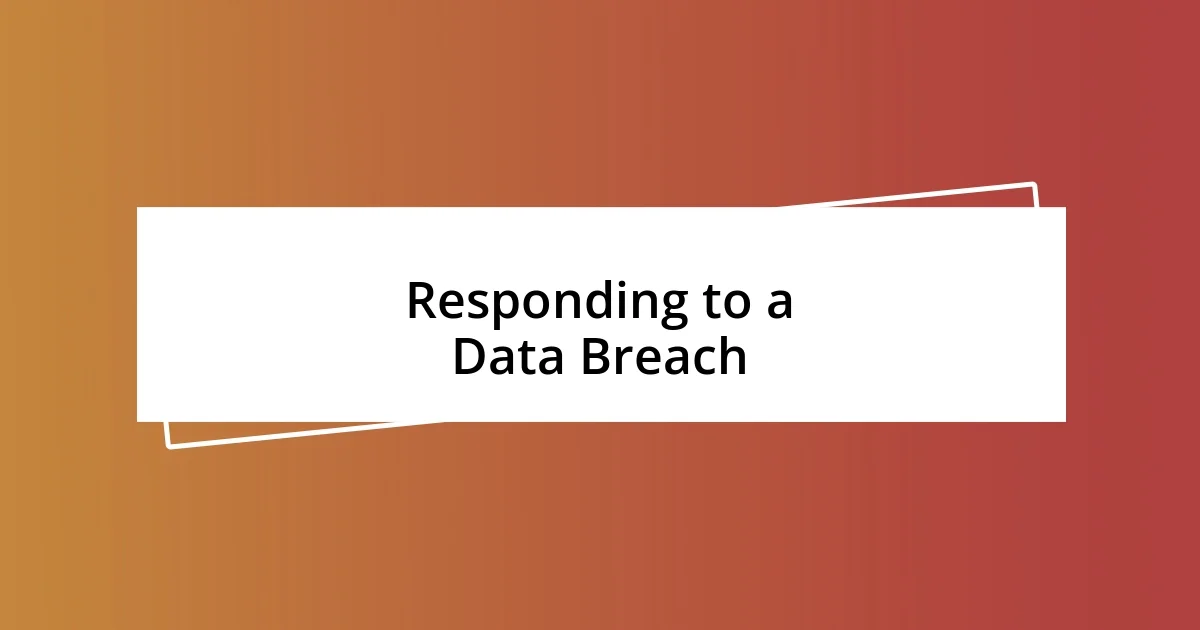
Responding to a Data Breach
When responding to a data breach, I found that speed is essential. I remember the heart-pounding anxiety when I first learned my data was compromised. The immediate step I took was to change my passwords on all accounts. This quick action felt empowering, though I later learned that simply changing passwords isn’t enough. I also needed to inform my contacts, as the breach could have impacted them too.
Another crucial element I discovered was the importance of documenting everything. I started keeping a record of events, from when I first noticed suspicious activity to whom I contacted for support. This not only helped me track the situation but also provided a reference for security experts who could assist in investigating further. Rhetorically speaking, how can we expect to resolve issues without a clear timeline? It’s like trying to solve a puzzle without knowing what pieces are missing.
Lastly, I learned about the significance of communication. I was surprised to find that many organizations prefer transparency during a breach incident. I reached out to the company involved, and they were surprisingly responsive. Their willingness to share what went wrong and what steps they were taking reassured me. It taught me that open dialogue fosters trust—an indispensable element when rebuilding after a breach. What would you want to know if your data was compromised? Being upfront with stakeholders can make a world of difference in regaining confidence.
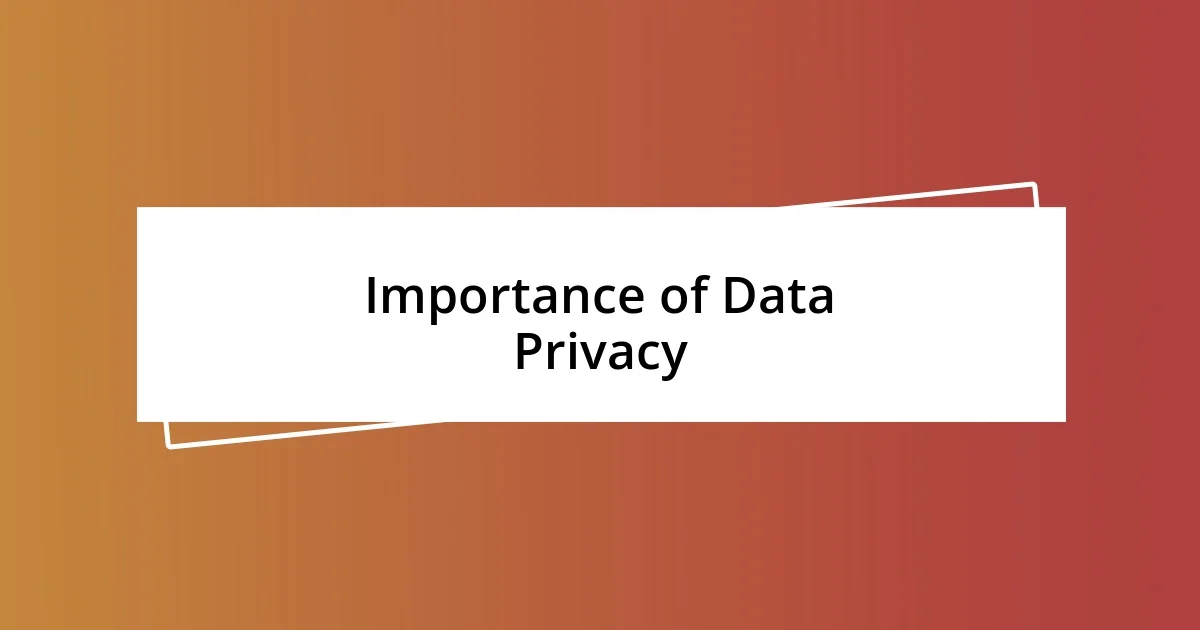
Importance of Data Privacy
The importance of data privacy can’t be overstated, especially in our digital age. I often reflect on my early online experiences, where I didn’t think twice about sharing personal information. Looking back, I realize how naive that was. Protecting our data is not just about keeping information safe; it’s about maintaining our identity and autonomy in a world where everything feels interconnected. How would you feel if your most private moments became public without your consent?
Moreover, data breaches can have devastating consequences, not just on an individual level but across entire organizations. I remember when a friend’s company suffered a breach, and the fallout was immense. Clients lost trust, employees felt insecure, and the financial impact was staggering. It left a lasting impression on me about the ripple effect of compromised data. It made me think twice about how I share my own information online. Data privacy isn’t just a personal issue—it’s a collective responsibility that we must all consider seriously.
Finally, I’ve come to appreciate the emotional toll that data breaches can take. After my own experiences, I felt a mix of vulnerability and anger, questioning how secure my information truly was. It highlighted the fragility of our digital lives. Have you ever had that sinking feeling of uncertainty about your online safety? I’ve learned that advocating for data privacy not only protects me but empowers those around me to be vigilant. We all deserve the right to feel secure in our digital presence.









